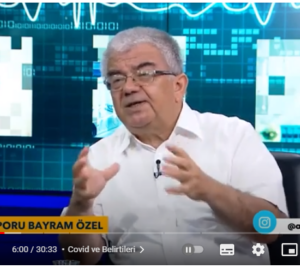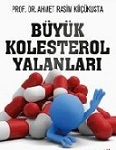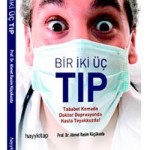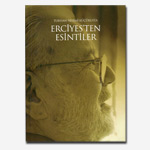TIP YAZILARI
- AĞIZ VE DİŞ SAĞLIĞI
- GECE DİŞ FIRÇALAMAK KALP DAMAR HASTALIKLARI RİSKİNİ AZALTIYOR
- DİŞ KAYBI BİLİŞSEL BOZUKLUK VE BUNAMA RİSKİNİ ARTIRIYOR
- DİŞETİ HASTALIKLARI AĞIR KOVİD’ E YOL AÇIYOR
- BAL DİŞ ÇÜRÜKLERİNİ ÖNLEYEBİLİR
- DİŞ HEKİMLERİ DİŞ MACUNU REKLÂMINA ALET EDİLMEMELİDİR
- DİŞLERİ FIRÇALAMAK ÇÜRÜKLERİ ÖNLEMİYOR
- GAZETECİLER ERKEK ÇORABI GİBİDİR, SAĞLARI SOLLARI BELLİ OLMAZ
- FIRÇALAMAYA EVET MACUNA HAYIR
- DİŞ MACUNLARI DİŞLERDEKİ EROZYONU VE HASSASİYETİ ÖNLEMİYOR
- AĞIZ VE DİŞ SAĞLIĞINDA YANLIŞLAR VE DOĞRULAR
- » Kategorinin tüm yazılarını göster
- AKCİĞER KANSERİ
- YAPAY ZEKÂ TOMOGRAFİLERİ RADYOLOGLARDAN DAHA İYİ DEĞERLENDİRİYOR
- AKCİĞER KANSERİ GENÇ KADINLARDA ERKEKLERE GÖRE DAHA FAZLA GÖRÜLÜYOR
- YÜKSEK DOZ B VİTAMİNLERİ AKCİĞER KANSERİ RİSKİNİ ARTIRIYOR
- BİRÇOK KİŞİ AKCİĞER KANSERİ TARAMALARINDAN ZARAR GÖRÜYOR
- AKCİĞER KANSERİ METASTAZLARINDA BEYİNE IŞIN TEDAVİSİNİN FAYDASI YOK
- GLİSEMİK İNDEKSİ YÜKSEK GIDALAR AKCİĞER KANSERİ RİSKİNİ DE ARTIRIYOR
- PROSTAT KANSERİNDE IŞIN TEDAVİSİ YENİ KANSER RİSKİNİ ARTIRIYOR
- TİROİT KANSERLERİ NEDEN ARTIYOR?
- NEFES SICAKLIĞINDAN AKCİĞER KANSERİ TEŞHİS EDİLEBİLİR Mİ?
- AKCİĞER KANSERLERİ AZALIYOR AMA...
- » Kategorinin tüm yazılarını göster
- ALERJİ
- ALFA-GAL SENDROMU
- MİDE İLAÇLARI ALERJİ RİSKİNİ DE ARTIRIYOR
- ALERJİSİ OLANA SAÇ UYARISI
- ÇOCUĞUN YERE DÜŞEN EMZİĞİNİ AĞIZDA TEMİZLEMEK ALERJİYİ ÖNLÜYOR
- YENİ BİR ALERJİK HASTALIK: EOZİNOFİLİK ÖZOFAJİT
- OTİSTİK ÇOCUKLARDA GIDA ALERJİSİ DAHA SIK GÖRÜLÜYOR
- EGZAMADA PAHALI BANYO NEMLENDİRİCİLERİN BİR FAYDASI YOK
- DERİDEKİ DOST BAKTERİLER EGZAMAYI İYİLEŞTİRİYOR
- TAHTAKURUSU OLAN EVLERİN TOZLARINDA YÜKSEK MİKTARDA HİSTAMİN BULUNDU
- GEBELİKTE FAZLA ŞEKER ASTIM VE ALERJİ RİSKİNİ ARTIRIYOR
- » Kategorinin tüm yazılarını göster
- ALERJİK NEZLE
- KORTİZONLU BURUN SPREYLERİ AĞIR KOVİD VE ÖLÜMLERİ ÖNLEYEBİLİR
- BADEMCİK VE GENİZ ETLERİNİN ALINMASI ASTIM, ALERJİ VE KOAH’A YOL AÇIYOR
- PAMUKLU KULAK ÇUBUKLARI ÇOCUKLARI ACİLLİK YAPIYOR
- BAHAR ALERJİSİNİN NEDENİ SAHRA TOZLARI MI
- PAMUKLU KULAK ÇUBUKLARINI ÇÖPE ATIN
- BURNUNDAN KIL ALDIRMAYANLAR DOĞRU YAPIYOR
- KÜÇÜK KIZ NEDEN GÜNDE 12 BİN KERE HAPŞIRIYOR?
- ALERJİK NEZLENİN KARDEŞLERİ
- HER HAPŞIRMA ALERJİDEN OLMAZ
- ALERJİK NEZLE NASIL TANINIR
- » Kategorinin tüm yazılarını göster
- AŞI TEDAVİSİ (İMMUNOTERAPİ)
- AŞILAR
- ZONA AŞISI BUNAMA TEŞHİSİNİ GECİKTİRİYOR
- SAĞLIK BAKANI KOCA DA AŞI KARŞITI İLAN EDİLDİ
- mRNA AŞILARI BAĞIŞIKLIK CEVAPLARINI ZAYIFLATABİLİYOR
- STRES BAĞIŞIKLIĞI YAŞLANDIRIYOR
- TETANOS VE DİFTERİ AŞILARI AĞIR KOVİD’ İ ÖNLEYEBİLİR
- REFİK SAYDAM HIFZISSIHHA ENSTİTÜSÜ KAPATILDI MI?
- ENVAİ ÇEŞİT AŞI GRUPLARI VAR
- YÜKSEK DOZ GRİP AŞISI STANDART DOZ AŞIDAN FARKLI BULUNMADI
- EN AZ 10 MİLYON GRİP AŞISINA İHTİYACI OLAN BİR ÜLKE NEDEN BU KADAR AZ AŞI ISMARLIYOR?
- BAZI AŞI ADAYLARININ AİDS RİSKİNİ ARTIRMA TEHLİKESİ VAR
- » Kategorinin tüm yazılarını göster
- ASTIM
- ATOPİK NÖTROFİLLER VİRAL ENFEKSİYON SONRASI ASTIMI ÖNLÜYOR
- ASTIM-KOAH İLACI KOVİD’ DE HASTANEYE YATIŞ RİSKİNİ AZALTIYOR
- ASTIM VE ALERJİLER AĞIR KOVİD RİSKİNİ ARTIRMIYOR
- ASTIM VE ALERJİ KOVİD’ E KARŞI KORUYOR
- VİTAMİN D DESTEĞİ ÇOCUKLARDA ASTIMI ÖNLEMİYOR
- EV TEMİZLİK ÜRÜNLERİ ASTIM RİSKİNİ ARTIRIYOR
- ASTIM SPREYLERİ KÜRESEL ISINMAYA YOL AÇIYOR
- DOĞUM KONTROL HAPLARI ASTIM RİSKİNİ ARTIRIYOR
- ASTIM VE BÖBREK TAŞI ARASINDAKİ SÜRPRİZ İLİŞKİ
- 25 SENELİK ÖKSÜRÜK İLAÇSIZ NASIL DÜZELDİ
- » Kategorinin tüm yazılarını göster
- BAĞIRSAK MİKROBİYOTASI
- KOLESTEROL YÜKSEKLİĞİ, KALP KRİZİ VE FELÇLERİN SEBEBİ BAĞIRSAK BAKTERİLERİYMİŞ
- BAĞIRSAK BAKTERİLERİ A VEYA B KAN GRUBUNU 0 GRUBUNA ÇEVİREBİLİYOR
- APANDİSİN ALINMASI KOLON VE REKTUM KANSERİ RİSKİNİ ARTIRIYOR
- DIŞKI BANKASINA YATIRIMINIZ SAĞLIĞINIZIN GÜVENCESİ OLACAK
- BATI TARZI DİYET KOLON KANSERİNE YOL AÇIYOR
- BAĞIRSAK MİKROBİYOTASININ BİR SIRRI DAHA ÇÖZÜLDÜ
- DOST BAKTERİ DEDİK BAĞRIMIZA BASTIK AMA…
- BAĞIRSAK BAKTERİLERİ VİRAL ENFEKSİYONLARA DİRENÇ SAĞLIYOR
- İLAÇLAR BAĞIRSAK BAKTERİLERİ İÇİNDE DEPOLANABİLİYOR
- PREBİYOTİKLER ENDİŞE VE KAYGIYI AZALTIYOR
- » Kategorinin tüm yazılarını göster
- BELİRTİLER
- BİRBİRLERİNDEN MUKADDES ALIP VERDİĞİM HER NEFES
- MERKEL GENE TİTREME NÖBETİ GEÇİRDİ
- ALMAN BAŞBAKANI MERKEL TİR TİR TİTREDİ
- PARMAK UÇLARININ ÇOMAKLAŞMASI
- ÖKSÜRÜRKEN KABURGASI KIRILDI
- SOĞUK ALGINLIĞINA BAĞLI ÖKSÜRÜKTE KORTİZONDAN DAHA FAYDALI TAVSİYELER
- NEDEN ÖKSÜRÜYORUZ?
- BİTTER ÇİKOLATA ÖKSÜRÜĞE İYİ GELİYOR
- GÖZLER ALTINDAKİ MOR HALKALARIN SEBEBİ NEDİR?
- HIÇKIRIK CİDDİ BİR HASTALIK BELİRTİSİ OLABİLİR
- » Kategorinin tüm yazılarını göster
- BESİN DESTEKLERİ
- B1 VİTAMİNİ EKSİKLİĞİ KABIZLIK YAPIYOR
- D VİTAMİNİ HAKKINDA KAFANIZI KARIŞTIRMAK İSTİYORUM
- MULTİVİTAMİNLER İŞE YARAMIYOR
- GEBELİKTE ALINAN BALIK YAĞI HAPLARI ÇOCUĞUN OBEZİTE RİSKİNİ ARTIRIYOR
- B3 VİTAMİNİ KANSER VE METASTAZ RİSKİNİ ARTIRIYOR
- YÜKSEK MİKTARDA B3 VİTAMİNİ KALP-DAMAR HASTALIKLARINA YOL AÇIYOR
- GIDA TAKVİYESİ DAYATMALARINA KANMAYIN
- VİTAMİN ALMADAN YAŞADIM, VİTAMİN İÇMEDEN DE ÖLECEĞİM
- DETOKS ETKİSİ YOK: SICAK SU VE LİMON MİTİ ÇÜRÜTÜLDÜ
- ZEYTİN MEYVESİ SUYU EGZERSİZ PERFORMANSINI ARTIRIYOR
- » Kategorinin tüm yazılarını göster
- BESLENME
- B1 VİTAMİNİ EKSİKLİĞİ KABIZLIK YAPIYOR
- SUNİ ET VE BÖCEK BURGER GİBİ YOZ GIDALAR KALP DAMAR HASTALIKLARI VE BUNLARA BAĞLI ÖLÜMLERİ ARTIRIYOR
- SUNİ TATLANDIRICI KSİLİTOL KALP KRİZİ, FELÇ VE ÖLÜM RİSKİNİ ARTIRIYOR
- KETO DİYET PSİKİYATRİK HASTALIKLARIN BELİRTİLERİNİ VE METABOLİK SENDROM BULGULARINI AZALTIYOR
- AVOKADO DİYABETİ ÖNLÜYOR
- PESTİSİTLER PARKİNSONA SEBEP OLUYOR
- NESTLE FAKİR ÜLKELERE SATTIĞI MAMALARA FAZLA MİKTARDA ŞEKER KOYUYOR
- KETO DİYET RUHSAL HASTALIKLARA DA İYİ GELİYOR
- YUMURTA KOLESTEROLÜ YÜKSELTMEZ
- KARACİĞER YAĞLANMASI BİR HASTALIK DEĞİL, BİR BESLENME HATASIDIR
- » Kategorinin tüm yazılarını göster
- BİSFENOL A = BPA
- BİSFENOL A ERKEN ÖLÜM RİSKİNİ DE ARTIRIYOR
- MİKRODALGA FIRINLARDAKİ SAĞLIK RİSKLERİ
- BİSFENOL A (BPA) OKSİDATİF STRESE YOL AÇIYOR
- YOKSA BİSFENOL A (BPA) BİR VİTAMİN Mİ?
- MEŞRUBAT KUTULARI TANSİYONU YÜKSELTİYOR
- KASA FİŞİ VE BANKAMATİK ÇIKTILARINDAKİ BÜYÜK TEHLİKE
- DİŞ MACUNUNDA KANSEROJEN VAR
- ANTİBAKTERİYEL SABUNLAR ANA RAHMİNDEKİ BEBEĞİ ETKİLİYOR
- KASA FİŞLERİNDEKİ GİZLİ TEHLİKE
- BİSFENOL A KARACİĞER KANSERİNE YOL AÇIYOR
- » Kategorinin tüm yazılarını göster
- CERRAHİ
- APANDİSİN ALINMASI KOLON VE REKTUM KANSERİ RİSKİNİ ARTIRIYOR
- ENFLAMASYONUN AMELİYATAN ÖNCE BASKILANMASI MİKROMETASTAZLARI ÖNLÜYOR
- APANDİS VE BADEMCİKLERİN 20 YAŞINDAN ÖNCE ALINMASI KALP KRİZİ RİSKİNİ ARTIRIYOR
- BU İKİ ESKİ İLAÇ KANSERDE METASTAZ VE NÜKSLERİ ÖNLÜYOR
- EV HAPSİ ERKEN DOĞUMLARI AZALTTI
- APANDİSİT ANTİBİYOTİKLERLE DE TEDAVİ EDİLEBİLİYOR
- AMELİYAT METASTAZLARIN BÜYÜMESİNE YOL AÇABİLİR
- BADEMCİK VE GENİZ ETLERİNİN ALINMASI ASTIM, ALERJİ VE KOAH’A YOL AÇIYOR
- PROSTAT KANSERİ AMELİYATLARI HAYATI UZATMIYOR
- EL İNSAF BE HOCAM!
- » Kategorinin tüm yazılarını göster
- ÇEŞİTLİ AKCİĞER HASTALIKLARI
- ÇÖLYAK GLUTEN
- GLUTEN HASSASİYETİ İLE PİYASA OLUŞTURULUYOR
- GLUTENSİZ DİYET KALP KRİZLERİNİ ÖNLEMİYOR
- ÇÖLYAK’ I BİR VİRÜS BAŞLATABİLİR
- GLUTEN SUÇLU MU GÜNAH KEÇİSİ Mİ?
- BUĞDAYDA GLUTENDEN BAŞKA NELER VAR?
- GLUTEN PARANOYASI
- EKMEK YİYELİM Mİ YEMEYELİM Mİ?
- MODERN BUĞDAY GERÇEKTEN ZARARLI MI?
- GLUTEN HASSASİYETİ GERÇEK BİR HASTALIK MI YOKSA PALAVRA MI?
- GLUTENSİZ DİYET DİYABET RİSKİNİ ARTIRIYOR
- » Kategorinin tüm yazılarını göster
- DİYABET
- GECE PARLAK IŞIK DİYABET RİSKİNİ ARTIRIYOR
- 5:2 ARALIKLI AÇLIK TİP 2 DİYABETİ İLAÇLARDAN DAHA İYİ TEDAVİ EDİYOR
- KELLE PAÇA ÇORBASI DİYABETE KALKANDIR
- DİYABETLİLERDE KOLON KANSERİ RİSKİ YÜKSEK
- YOGA, DİYABETTE İLAÇLAR KADAR ETKİLİ OLUYOR
- GEÇ YATMAK DİYABETE YOL AÇIYOR
- DEPRESYON TİP 2 DİYABET İÇİN DOĞRUDAN BİR RİSK FAKTÖRÜ
- HER YARIM SAATTE BİR 5 DAKİKA YÜRÜMEK ŞEKERİ VE TANSİYONU DÜŞÜRÜYOR
- TİP 2 DİYABET DÜŞÜK KARBONHİDRATLI BESLENME İLE TAMAMEN DÜZELİYOR
- TİP 2 DİYABET ARALIKLI AÇLIK BESLENME MODELİYLE TAMAMEN DÜZELEBİLİYOR
- » Kategorinin tüm yazılarını göster
- DOMUZ GRİBİ
- DOMUZ GRİBİNE 'MİNNOŞ KEDİ GRİBİ' YA DA KUŞ GRİBİNE 'BÜLBÜL GRİBİ' DENİLSEYDİ BU KADAR KORKMAYACAKTIK
- 'DOMUZ GRİBİ ADI KORKUTMA AMAÇLI KULLANILIYOR'
- YÜZYILIN EN BÜYÜK TIBBİ SKANDALLARINDAN BİRİ
- GRİP AŞISI UYKU HASTALIĞINA YOL AÇIYOR
- GAZETECİLER TIBBİ KONULARDA AHKÂM KESMEMELİ
- ÇOK ŞÜKÜR Kİ GENE DOMUZ GRİBİ VİRÜSÜ
- DOMUZ GRİBİ AŞISI UYKU HASTALIĞI YAPAR MI?
- GRİP AŞISI GRİBİ DAHA DA AĞIRLAŞTIRIYOR
- DOMUZ GRİBİ 18 BİN DEĞİL, 280 BİN ÖLÜME SEBEP OLMUŞ
- GRİP AŞISI UYKU HASTALIĞI YAPIYOR
- » Kategorinin tüm yazılarını göster
- ENFEKSİYONLAR
- ZONA AŞISI BUNAMA TEŞHİSİNİ GECİKTİRİYOR
- SİFON ÇEKİLİRKEN TUVALET KAPAĞININ KAPALI OLMASININ YÜZEYLERE VİRÜS YAYILMASINA ETKİSİ YOK
- SEPSİSİ ERKEN TEŞHİS EDEBİLECEK TEST UMUT VERİYOR
- KOVİD' DEN 20 MİSLİ FAZLA ÖLDÜRÜCÜ HASTALIK X SALGINI HER AN BAŞLAYABİLİR
- ARTIK NUR TOPU GİBİ YENİ BİR VİRÜSÜMÜZ VAR
- HUZURLARINIZDA YENİ VİRÜSÜMÜZ: METAPNÖMOVİRÜS (MPV)
- SOĞUK ALGINLIĞI, GRİP İLAÇLARINDA FELÇ VE ÖLÜM RİSKİ VAR
- SOĞUK HAVA BURUNDAKİ BAĞIŞIKLIĞI ZAYIFLATARAK ENFEKSİYONLARI KOLAYLAŞTIRIYOR
- BURUN KARIŞTIRMAK BUNAMAYA ZEMİN HAZIRLIYOR OLABİLİR
- AVRUPA VE ABD'DE ÇOCUKLARDA AÇIKLANAMAYAN HEPATİT VAKALARI
- » Kategorinin tüm yazılarını göster
- GDO
- YABANİ OT İLACI KANSER RİSKİNİ ARTIRIYOR
- BÜYÜK GDO YALANLARI
- GIDALARIN İNSAN DNA' SINA NET ETKİLERİ TESPİT EDİLDİ
- GLİFOSAT KANSERE YOL AÇMAKLA SUÇLANIYOR
- ORGANİK YUMURTADA BİLE KANSEROJEN YABANİ OT İLACI ÇIKTI
- YABANİ OT İLACI GLİFOSAT KANSEROJEN İLAN EDİLDİ
- GDO'LU MISIRDAKİ BÜYÜK TEHLİKE
- GDO GENLERİ PARÇALANMADAN KANA GEÇEBİLİYOR
- » Kategorinin tüm yazılarını göster
- GENETİK
- DİKKAT EKSİKLİĞİ HİPERAKTİVİTE VE BUNAMA ARASINDA BAĞLANTI VAR
- OBEZİTE RİSKİNİ ARTIRAN GENLER KALP VE METABOLİK HASTALIKLARDAN DA KORUYOR
- BAZI ÇOCUKLAR GENETİK OLARAK METİL CIVAYA DAHA HASSAS OLABİLİRLER
- BABALARINA BENZEYEN ÇOCUKLAR DAHA SAĞLIKLI OLUYOR
- ÇAY KADINLARDA EPİGENETİK DEĞİŞİKLİKLERE YOL AÇIYOR
- ÜÇ EBEVEYNİ OLAN BEBEK DÜNYAYA GELDİ
- SİGARANIN ETKİSİ 30 YIL SONRA DA DEVAM EDİYOR
- ANNE BABASI UZUN YAŞAYAN KALP HASTASI OLMUYOR
- DEPRESYON DA GENETİK ÇIKTI
- DNA' NIN BÜYÜK SIRRI KEŞFEDİLDİ
- » Kategorinin tüm yazılarını göster
- GRİP
- HACCIN BU SENE DE KURBAN BAYRAMI'NA DENK GELMESİ GİBİ, BU KIŞ DA GRİP VAKALARI ARTTI
- GRİP, HASTANEYE YATMA VE OSELTAMİVİR
- SOĞUK HAVA BURUNDAKİ BAĞIŞIKLIĞI ZAYIFLATARAK ENFEKSİYONLARI KOLAYLAŞTIRIYOR
- KUERSETİN GRİP VİRÜSÜNÜN HÜCREYE GİRMESİNİ ÖNLEYEBİLİR
- HİNDİSTAN’ DAKİ DOMATES GRİBİ SALGINI ENDİŞE YARATIYOR
- BU SENENİN GRİP AŞILARI DA MUTASYON KURBANI
- YAŞLILARDA GRİP AŞISININ UZUN VADELİ MORTALİTEYE ETKİSİ YOK
- BU SENE ÇOK GRİP VAKASI OLMASI ALLAH' IN EMRİDİR
- GRİP AŞILARI AĞIR KOVİD RİSKİNİ AZALTIYORMUŞ
- GRİP AŞILARI KORONAVİRÜSE KARŞI KORUYUCU OLABİLİR
- » Kategorinin tüm yazılarını göster
- HAVALAR
- SOĞUK BEYİN SAĞLIĞINA İYİ GELİYOR, ÖMRÜ UZATIYOR
- DONDURUCU SOĞUKLARIN FAYDALARI DA VAR
- "SOĞUK BİR KIŞ BİZİ BEKLİYOR" DİYE KEDERLENMEYİN, SOĞUK HAVALARIN SAĞLIMIZA ÖYLE BÜYÜK FAYDALARI VAR Kİ…
- HAVA KİRLİLİĞİ DEPRESYON VE BİPOLAR BOZUKLUĞA SEBEP OLUYOR
- BENİ BU LODOSLU HAVALAR MAHVETTİ
- HELYUM ZEHİRLENMESİNİN BELİRTİLERİ NELERDİR
- ASTIM SPREYLERİ KÜRESEL ISINMAYA YOL AÇIYOR
- KİRLİ HAVADAKİ KURUM PLASENTAYA KADAR ULAŞIYOR
- SAĞLIK SEKTÖRÜNÜN KÜRESEL İKLİM KRİZİNE BÜYÜK KATKISI VAR
- İKLİM DEĞİŞİKLİĞİNİN SEBEBİ İNSANLAR VE HAYVANLAR DEĞİLDİR
- » Kategorinin tüm yazılarını göster
- İSTANBUL BRONŞİTİ
- KANSER
- AĞIZ ÇALKALAMA SIVILARINDA KANSER RİSKİ VAR
- OTOMOBİLLERDEKİ ALEV ALMAYI ÖNLEYEN KİMYASALLAR CİDDİ RİSK YARATIYOR
- ÜZERİNDE KORUYUCU YAZAN NE GÖRÜRSENİZ UZAK DURUN!
- B3 VİTAMİNİ KANSER VE METASTAZ RİSKİNİ ARTIRIYOR
- DÜŞÜK DOZ TOMOGRAFİ BİLE ÇOCUKLARDA KAN KANSERİ RİSKİNİ ARTIRIYOR
- GIDA KATKI MADDELERİNDEKİ KIVAM VERİCİLER SAĞLIĞINIZIN KIVAMINI BOZABİLİR
- AŞIRI İŞLENMİŞ YANİ YOZ GIDALAR AĞIZ BOĞAZ VE YEMEK BORUSU KANSERİNE YOL AÇIYOR
- DİYABETLİLERDE KOLON KANSERİ RİSKİ YÜKSEK
- ENFLAMASYONUN AMELİYATAN ÖNCE BASKILANMASI MİKROMETASTAZLARI ÖNLÜYOR
- KANSERİ ÖNLEYEN MUHTEŞEM ÜÇLÜ
- » Kategorinin tüm yazılarını göster
- KANSER TARAMALARI
- 40 YAŞ VE ÜZERİ KADINLAR İÇİN MAMOGRAFİLER NE İŞE YARAR?
- MEME KANSERİNDEN KORUNMAK İÇİN "KİŞİSEL BAKIM KİMYASALLARI"NDAN UZAK DURUN
- MEME KANSERİ AKCİĞER KANSERİNİ GEÇTİ
- KALIN BAĞIRSAK TARAMALARI RİSKİ DÜŞÜK OLANLAR İÇİN GEREKLİ DEĞİL
- MAMOGRAFİ TARAMALARININ POTANSİYEL RİSK VE FAYDALARI HER KADIN İÇİN FARKLIDIR
- MEME KANSERİ TARAMASINA YENİ KAİDELER GELİYOR
- ERKEKLER PROSTAT TARAMALARINA KENDİLERİ KARAR VERMELİDİR
- SU ŞİŞELERİNDE KANSERDE ERKEN TANI UYARISI
- HER TÜMÖR MUTLAKA KANSER Mİ OLUR
- MAMOGRAFİ HER KADINA DEĞİL ONAY VERENLERE YAPILMALIDIR
- » Kategorinin tüm yazılarını göster
- KIŞ HASTALIKLARI
- SOĞUK BEYİN SAĞLIĞINA İYİ GELİYOR, ÖMRÜ UZATIYOR
- SOĞUK HAVA BURUNDAKİ BAĞIŞIKLIĞI ZAYIFLATARAK ENFEKSİYONLARI KOLAYLAŞTIRIYOR
- ÖKSÜRÜK VE SOĞUK ALGINLIĞI İLAÇLARI ÇOCUKLARDA ÖLÜME YOL AÇIYOR
- BU YÖNTEMLE ÖKSÜRÜK VE BRONŞİT TARİHE KARIŞACAK
- VİCKS KÜÇÜK ÇOCUKLAR İÇİN ÇOK SAKINCALI
- SOĞUKTA PARMAKLARI UYUŞAN VE AĞRIYANLARIN HASTALIĞI
- DÜNYANIN EN SEVİLEN HASTALIĞI
- AYAK TABANINA VEYA GÖĞSE VİCKS SÜRMENİN FAYDASI YOK
- SOĞUK ISIRMASI VE LOKAL DONMALAR
- DONDURUCU SOĞUKLARIN FAYDALARI DA VAR
- » Kategorinin tüm yazılarını göster
- KOAH
- OKSİJENLERİ ORTA DERECEDE DÜŞÜK OLAN KOAH' LILARDA OKSİJEN TEDAVİSİNİN FAYDASI YOK
- ASTIM-KOAH İLACI KOVİD’ DE HASTANEYE YATIŞ RİSKİNİ AZALTIYOR
- KETO DİYET KOAH'A DA İYİ GELİYOR
- AMFİZEMLİ HASTALAR İÇİN YENİ BİR TEDAVİ UMUDU
- KOAH VE ASTIM İLAÇLARI KALP HASTALIĞI RİSKİNİ ARTIRIYOR
- ÇAMAŞIR SUYU KOAH RİSKİNİ ARTIRIYOR
- TUZ LAMBASI, TUZ ODASI, MAĞARA TEDAVİSİNİN BİLİMSEL DEĞERİ YOKTUR
- FİZİKİ AKTİVİTE ANKSİYETE VE DEPRESYONU AZALTIYOR
- FAZLA KİLOLU KOAH’ LILAR DAHA UZUN YAŞIYOR
- KOAH TARAMALARININ VE ERKEN TEŞHİSİN HİÇBİR FAYDASI YOK
- » Kategorinin tüm yazılarını göster
- KOLESTEROL
- KALP KRİZİ VE FELÇ GEÇİRMEMİŞ OLANLARIN ASPİRİN ALMASI HEM FAYDASIZ HEM RİSKLİ
- MİLYONLARCA İNSAN BOŞ YERE KOLESTEROL HAPI İÇİYOR
- KOLESTEROL YÜKSEKLİĞİ, KALP KRİZİ VE FELÇLERİN SEBEBİ BAĞIRSAK BAKTERİLERİYMİŞ
- YUMURTA KOLESTEROLÜ YÜKSELTMEZ
- YUMURTA, KIRMIZI ET, TEREYAĞI KOLESTEROLÜ YÜKSELTMEZ
- YÜKSEK MİKTARDA B3 VİTAMİNİ KALP-DAMAR HASTALIKLARINA YOL AÇIYOR
- BÜYÜK KOLESTEROL İKİLEMİ VE KÜRESEL BİLİNÇ UYANIŞI
- MİLYONLARCA İNSANA TANSİYONLARI DOĞRU ÖLÇÜLMEDİĞİ İÇİN BOŞUNA İLAÇ VERİLİYOR
- GECE DİŞ FIRÇALAMAK KALP DAMAR HASTALIKLARI RİSKİNİ AZALTIYOR
- KALP YETERSİZLİĞİ OLAN BEKÂR ERKEKLERİN ÖLÜM RİSKİ 2 MİSLİ FAZLA
- » Kategorinin tüm yazılarını göster
- KORONAVİRÜS
- KOVİD İLACI PAXLOVİD FİYASKOSU
- PANDEMİNİN ARDINDAN AKILDA KALMASI GEREKENLER
- BİLİMİN ZIRT DEDİĞİ YER
- KOVİD PAXLOVİD KULLANAN HER 5 KİŞİDEN BİRİNDE TEKRARLIYOR
- TUZLU SUYLA GARGARA KOVİD İÇİN HASTANEYE YATIŞI ÖNLÜYOR
- KOVİD' DEN 20 MİSLİ FAZLA ÖLDÜRÜCÜ HASTALIK X SALGINI HER AN BAŞLAYABİLİR
- N95 SANA SÖYLÜYORUM, CERRAHİ MASKE SEN ANLA
- KOVİD' DE SİTOKİN FIRTINASI EFSANESİ DE ÇÖKTÜ
- YÜZ MASKELERİ ÖLÜ DOĞUM VE BİLİŞSEL BOZUKLUK RİSKİNİ ARTIRIYOR
- MASKENİN ALTINDAN ÇIKAN GERÇEKLER
- » Kategorinin tüm yazılarını göster
- KOVİD AŞISI
- OTOPSİ ÇALIŞMASINA GÖRE mRNA AŞILARI ÖLÜME YOL AÇIYOR
- KOVID-19 PANDEMİSİNDEN BU YANA BATI DÜNYASINDA FAZLADAN ÖLÜM ORANLARI
- AŞI KARŞITLIĞI NEDEN ARTTI, MÜSEBBİBİ KİM?
- MALUM SIVILAMALAR SONRASI ARTIŞ GÖSTEREN CİDDİ BİR HASTALIK DAHA
- TÜM DÜNYA KANDIRILDI, TEHDİT EDİLDİ, ZORLANDI
- AŞILAR KALBE İYİ GELİYOR DİYEN MAKALE ÇÖPTÜR
- HARVARD HAKİKATİ ÇİĞNİYOR
- mRNA AŞILARI, CREUTZFELDT-JAKOB VE DELİ DANA HASTALIĞI İLE BAĞLANTILI OLABİLİR
- mRNA AŞILARI İSTENMEYEN PROTEİNLERİN DE OLUŞUMUNA YOL AÇIYOR
- KOVİD-19 AŞILARI KIRIK KALP SENDROMU’ NA SEBEP OLABİLİYOR
- » Kategorinin tüm yazılarını göster
- MEDYA
- KOVİD-19 SALGININ FELAKET TELLALI: MEHMET CEYHAN
- BİR TİVİTİN ORTAYA DÖKTÜKLERİ
- ARENA PROGRAMINDAKİ TARTIŞMAYA PROF. DR. COŞKUN ÖZDEMİR' İN ELEŞTİRİLERİ
- DENİZ ZEYREK' DEN CEVAP VAR AMA SUALLERİME DEĞİL
- AŞISIZA BAKMAYAN DOKTOR
- AŞI KARŞITI VE AŞI TARAFTARLARININ SOSYAL MEDYA ANALİZİ
- MEHMET CEYHAN NE DEDİ NE ÇIKTI, BİLİM NE DİYOR, GERÇEKLER NE?
- "O İDDİA DOĞRU DEĞİLMİŞ" DEMEK YETMEZ!
- EY AHMET HAKAN, AL SANA TÜKENENLERDEN BİR DEMET!
- AMERİKALI DOKTORDAN KORONAVİRÜS İÇİN SİYAH ÇAY ÖNERİSİ!
- » Kategorinin tüm yazılarını göster
- MEHMET ÖZ
- VİRÜS BİZİM DÜŞMANIMIZ DEĞİL, HEPİMİZ YAKALANACAĞIZ
- KAHVALTI YASAKLANMALIDIR
- MEHMET ÖZ SAĞLIK BAKANIMIZ OLSA!
- BAŞ AĞRISINA TABİİ İLAÇ: GÜMÜŞDÜĞME OTU ÇAYI
- MEHMET ÖZ’ ÜN TAVSİYELERİ DÜZMECE ÇIKTI
- ŞOVMEN DOKTORLAR
- BİLDİKLERİNİZİ UNUTUN, DOYMUŞ YAĞLAR TEHLİKELİ DEĞİLMİŞ!
- YEŞİL KAHVE ARAŞTIRMASI SAHTE ÇIKTI
- MEHMET ÖZ' DOLANDIRICILIK SUÇLAMASI
- MEHMET ÖZ HAKINDA ŞOK SUÇLAMA
- » Kategorinin tüm yazılarını göster
- MODERN HAYAT
- AĞIZ ÇALKALAMA SIVILARINDA KANSER RİSKİ VAR
- OTOMOBİLLERDEKİ ALEV ALMAYI ÖNLEYEN KİMYASALLAR CİDDİ RİSK YARATIYOR
- ÜZERİNDE KORUYUCU YAZAN NE GÖRÜRSENİZ UZAK DURUN!
- EVLERDE SAYISIZ ÜRÜNDE BULUNAN KİMYASALLAR BEYİN HÜCRELERİNDE HASARA YOL AÇIYOR
- GECE IŞIĞINA FAZLA MARUZ KALMAK ANKSİYETE, DEPRESYON RİSKİNİ ARTIRIYOR
- GECE AÇIK HAVADAKİ YAPAY IŞIKLAR DİYABET RİSKİNİ ARTIRIYOR
- BU TARIM ZEHİRİ ÖLÜM RİSKİNİ ARTIRIYOR
- SALLAMA ÇAY POŞETLERİNDEN MASKELERE KADAR HAYATIMIZ MİKROPLASTİKLERLE DOLU
- GÖZ MİGRENİ
- BATI DİYETİ BAĞIRSAK PANETH HÜCRELERİNİN İŞLEVİNİ DE BOZUYOR
- » Kategorinin tüm yazılarını göster
- OBEZİTE
- KARACİĞER YAĞLANMASI ADAM GİBİ BESLENMEYLE DÜZELİYOR
- YENİ PARAMETREMİZ: BİYOLOJİK VÜCUT KİTLE ENDEKSİ
- FAZLA KİLOLAR DA İNSANLARIN MÜSİLAJIDIR
- KOVİD’ İ FAZLA KİLO VEYA OBEZİTE DEĞİL, ENFLAMASYON AĞIRLAŞTIRIYOR
- TIP DÜNYASININ YENİ HASTALIĞI: KOVEZİTE
- VÜCUT KİTLE ENDEKSİ ARTTIKÇA AĞIR KOVİD RİSKİ DE ARTIYOR
- VÜCUT KİTLE İNDEKSİNİ SAĞLIK ÖLÇÜSÜ OLARAK KULLANMAYI BIRAKIN
- OBEZİTE RİSKİNİ ARTIRAN GENLER KALP VE METABOLİK HASTALIKLARDAN DA KORUYOR
- CRP SADECE İLTİHABI GÖSTERMİYOR, OBEZİTE VE DİYABETTE DE ROLÜ VAR
- MAKROFAJLARA MİTOKONDRİ TRANSFERİ BEYAZ YAĞ DOKUSU DENGESİNİ DÜZENLİYOR
- » Kategorinin tüm yazılarını göster
- RAHİM AĞZI KANSERİ AŞISI
- 9 YAŞINDAN İTİBAREN TÜM KIZ ÇOCUKLARI VE KADINLARI AŞILAYALIM. ÖYLE Mİ?
- RAHİM VE RAHİM AĞZI KANSERLERİ 1970' LERDEN BERİ AZALIYORKEN...
- RAHİM AĞZI KANSERİ AŞISINDA KISIRLIK RİSKİ DE VAR
- SÖZCÜ GAZETESİNDE GİZLİ AŞI REKLÂMI
- SON MODEL RAHİM AĞZI KANSERİ AŞISI ÇIKTI
- HÜRRİYET’ TEKİ SAĞLIK HABERİNİN ARKASINDA NE VAR?
- RAHİM AĞZI KANSERİ VE AŞISI İLE İLGİLİ YANLIŞ BİLGİLENDİRME YAPILIYOR
- TÜRK JİNEKOLOJİ VE OBSTETRİK DERNEĞİ BU SORULARIMA CEVAP VERMELİDİR
- SEZARYEN KISIR DÖNGÜ
- OTORİTELER HPV AŞISI İÇİN NE DİYOR?
- » Kategorinin tüm yazılarını göster
- REFLÜ
- TİP 2 DİYABET GİBİ REFLÜ DE İLAÇSIZ TAMAMEN DÜZELİR
- FINDIKIRAN HASTALIĞI
- REFLÜ İLAÇLARI, ÖKSÜRÜK VE BOĞAZ ŞİKÂYETLERİNDE İŞE YARAMIYOR
- MİDE KORUYUCU İLAÇLAR TİP 2 DİYABET RİSKİNİ DE ARTIRIYOR
- HARVARD: REFLÜ İLAÇSIZ DA TEDAVİ EDİLEBİLİR
- SIK KULLANILAN İLAÇLARIN YARISI BAĞIRSAK BAKTERİLERİNİ ETKİLİYOR
- MİDE KORUYUCU İLAÇLAR KANAMA RİSKİNİ AZALTMIYOR
- MİDE İLAÇLARI ALERJİ RİSKİNİ DE ARTIRIYOR
- MİDE KORUYUCULAR DEPRESYON RİSKİNİ DE ARTIRIYOR
- MİDE KORUYUCU İLAÇLAR MİDE KANSERİNE YOL AÇIYOR
- » Kategorinin tüm yazılarını göster
- RUHSAL HASTALIKLAR
- ZONA AŞISI BUNAMA TEŞHİSİNİ GECİKTİRİYOR
- MİDEDEN SALGILANAN AÇLIK HORMONU RUH HÂLİNİ ETKİLİYOR
- PESTİSİTLER PARKİNSONA SEBEP OLUYOR
- ANTİDEPRESANLAR REÇETESİZ OLARAK MARKETLERDE SATILMALIDIR
- ŞEKER DEPRESYON RİSKİNİ DE ARTIRIYOR
- SICAK YOGA DEPRESYONU TAMAMEN ORTADAN KALDIRABİLİR
- SOĞUK BEYİN SAĞLIĞINA İYİ GELİYOR, ÖMRÜ UZATIYOR
- KAHVE TELVESİ PARKİNSON VE ALZHEİMERİ ÖNLEYEBİLİR
- GECE IŞIĞINA FAZLA MARUZ KALMAK ANKSİYETE, DEPRESYON RİSKİNİ ARTIRIYOR
- YALNIZ YAŞAYANLARIN KEDİ VEYA KÖPEK BESLEMESİ BUNAMA RİSKİNİ AZALTIYOR
- » Kategorinin tüm yazılarını göster
- SİGARA
- SİGARAYI BIRAKTIRMA İLACI KANSEROJEN MADDE BULUNDUĞU İÇİN TOPLATILIYOR
- ELEKTRONİK SİGARA İTHALATI YASAKLANDI
- ELEKTRONİK SİGARALARDA MİKROP TOKSİNİ DE BULUNDU
- ELEKTRONİK SİGARALAR AKCİĞER HASARINA VE ÖLÜMLERE YOL AÇIYOR
- ELEKTRONİK SİGARAYA BAĞLI AKCİĞER HASTALIĞI VE ÖLÜMLER ARTIYOR
- MARLBORO, ELEKTRONİK SİGARA DEVİ İLE BİRLEŞİYOR
- TEK BİR ELEKTRONİK SİGARA BİLE DAMARLARI BOZUYOR
- AMERİKA’ DA ESRARENGİZ AKCİĞER HASTALIĞI
- DÜNYADA BİR ŞEHİR SİGARAYI TAMAMEN YASAKLIYOR
- ELEKTRONİK SİGARALAR DAMARLARI BOZUYOR
- » Kategorinin tüm yazılarını göster
- SPOR VE EGZERSİZ
- MERDİVEN ÇIKMAK KALBİ KORUYOR, HAYATI UZATIYOR
- KALP SAĞLIĞI VE METABOLİZMA İÇİN UYUMAK OTURMAKTAN DAHA FAYDALI
- YOGA, DİYABETTE İLAÇLAR KADAR ETKİLİ OLUYOR
- GÜNDE 10 BİN ADIM EFSANESİ SORGULANIYOR
- EGZERSİZ KARACİĞER YAĞLANMASINI AZALTIYOR
- KOŞMAK EKLEMLERDE KİREÇLENMEYE YOL AÇMADIĞI GİBİ, AKSİNE EKLEMLERİ KORUYOR
- SOĞUK SUDA YÜZMEK İLAÇ GİBİ
- EGZERSİZ, DEPRESYON TEDAVİSİNDE İLAÇLARDAN DAHA ETKİLİ
- ÖĞLEDEN SONRA YAPILAN EGZERSİZ ÖLÜM RİSKİNİ DAHA ÇOK AZALTIYOR
- HER YARIM SAATTE BİR 5 DAKİKA YÜRÜMEK ŞEKERİ VE TANSİYONU DÜŞÜRÜYOR
- » Kategorinin tüm yazılarını göster
- TEŞHİS
- TİROİT
- PFAS TÜRÜ KİMYASALLAR TİROİT KANSERİ RİSKİNİ ARTIRIYOR
- KOVİD AŞILARINDAN SONRA TİROTOKSİKOZ RİSKİ DE VAR
- KRONİK YORGUNLUK SENDROMU TİROİT HORMONLARI AZLIĞI İLE İLİŞKİLİ BULUNDU
- SİGARA TİROİT KANSERİNDEN KORUYOR
- TİROİT KANSERLERİ DEĞİL KANSER TEŞHİSİ ARTIYOR
- TİROİT KANSERİ TARAMALARININ FAYDADAN ÇOK ZARARI VAR
- TİROİT KANSERLERİ KADINLARDA ARTIYOR
- YÜKSEK TİROİT HORMON SEVİYELERİ ANİ KALP ÖLÜMLERİNE YOL AÇIYOR
- BAZI TİROİT TÜMÖRLERİ KANSER SINIFINDAN ÇIKARILDI
- TİROİT KANSERLERİ HER GEÇEN GÜN HIZLA ARTIYOR
- » Kategorinin tüm yazılarını göster
- TÜBERKÜLOZ
- TÜBERKÜLOZ AŞISI DAMAR YOLUYLA DAHA ETKİLİ OLABİLİR
- TÜBERKÜLOZ TEŞHİSİNDE DEVRİM YARATABİLECEK TEST
- İNCE HASTALIĞIN "İNCELİKLERİ"
- KORUYUCU VEREM TEDAVİSİ GEREKLİ Mİ?
- EYVAH, BALGAMIMDA KAN VAR!
- BAHÇELERDE MOR MENİ VEREM ETTİN SEN BENİ
- EKONOMİK KRİZ VEREMLE VURABİLİR
- TÜBERKÜLOZ TEDAVİSİ
- TÜBERKÜLOZDA TEŞHİS YÖNTEMLERİ
- TÜBERKÜLOZ NASIL BULAŞIR?
- » Kategorinin tüm yazılarını göster
- UZUN YAŞAMA
- 100 YILI AŞMANIN SIRRI DA BAĞIRSAK BAKTERİLERİNDE
- YAŞLANMAYI ÖNLEMEDE YENİ BİR YÖNTEM
- KALP YETERSİZLİĞİ OLAN BEKÂR ERKEKLERİN ÖLÜM RİSKİ 2 MİSLİ FAZLA
- TABİATTA ZAMAN GEÇİRMEK PARKİNSON VE ALZHEİMER’İN SEYRİNİ YAVAŞLATIYOR
- YOGA STRES VE ENFLAMASYONUN ZARARLI ETKİLERİNİ AZALTIYOR
- AĞIR KOVİD’ İ ÖNLEMENİN SIRRI: ADAM GİBİ VEYA RAHİBE GİBİ YAŞAMAK!
- KASLARI ÇALIŞTIRMAK KRONİK ENFLAMASYONU ÖNLÜYOR
- GÜNEŞ IŞINLARI, VİTAMİN D SENTEZİ DIŞINDA T HÜCRELERİNİN ENERJİSİNİ ARTIRIYOR, BAĞIŞIKLIĞI GÜÇLENDİRİYOR
- EBEDİ GENÇLİĞİN SIRRI DIŞKI NAKLİNDE OLABİLİR
- AŞIRI İŞLENMİŞ GIDALAR YAŞLANMAYI HIZLANDIRIYOR
- » Kategorinin tüm yazılarını göster
- YAZ HASTALIKLARI
- GÜNEŞ KREMİ PARADOKSU
- BİR GÜN SICAĞA MARUZ KALMAK BİLE BAĞIŞIKLIĞI BOZARAK KALP KRİZİ VE ÖLÜMLERE YOL AÇABİLİR
- SICAK SENDROMLARI VE BUNLARDAN KORUNMA YOLLARI
- DENİZDE ÜZERİNE DALGA GELEN ÇOCUK 1 HAFTA SONRA YATAĞINDA BOĞULARAK ÖLDÜ
- SICAKLARDA SAĞLIKLI YAŞAMAK İÇİN NELER YAPALIM?
- VÜCUDUNUZUN SUSUZ KALDIĞINI NASIL ANLARSINIZ?
- SICAK ÇARPMASI ÖLDÜREBİLİR
- KENELER ÇIKTI MEYDANE
- SU ZEHİRLENMESİ ÖLDÜREBİLİR
- DAM PALAS SENDROMU
- » Kategorinin tüm yazılarını göster
- ZATÜRREE
- KOVİD' DE SİTOKİN FIRTINASI EFSANESİ DE ÇÖKTÜ
- PNÖMONİLERİN ÇOĞU AŞIRI TEŞHİSTİR
- ELTON JOHN ATİPİK ZATÜRRE OLDU
- ÇOCUKLARDAKİ ZATÜRRELERİN ÇOĞUNUN SEBEBİ VİRÜSLER
- BRONŞİT VE ZATÜRRE ARASINDAKİ FARKLAR NELERDİR
- ELEKTRONİK SİGARA ZATÜRRE RİSKİNİ ARTIRIYOR
- YENİ ZATÜRRE AŞISI ESKİLERİN PABUCUNU DAMA ATIYOR
- KİSTİK FİBROZDA PNÖMOKOK AŞISINI DESTEKLEYEN DELİLLER YETERLİ DEĞİL
- KLİMA ZATÜRREESİ
- ZATÜRRE BAŞLANGICI
- » Kategorinin tüm yazılarını göster
ELEŞTİREL YAZILAR
- ALTERNATİF TIP
- OZON TEDAVİSİ AĞIR KOVİD' İ ÖNLÜYOR
- TIBBIN BİR SORUNU MU VAR
- BEBEĞİN İLK BANYOSUNUN GECİKTİRİLMESİ DAHA FAYDALI
- SAFRAN DİKKAT EKSİKLİĞİ HİPERAKTİVİTE TEDAVİSİNDE ETKİLİ BULUNDU
- AKUPUNKTUR DOĞUM SANCILARI İÇİN ETKİLİ VE EMNİYETLİ BİR YÖNTEMDİR
- HACAMAT TEDAVİSİ TOPUK DİKENİNDE İŞE YARIYOR
- BİTKİSEL İLAÇLARDAKİ OYUN BOZULDU
- DETOKS ŞART MI
- SOLUNUM VE CİLT HASTALIKLARI İÇİN "HALO TERAPİ" MERKEZİ
- TUZ LAMBALARI FAYDALI MI YOKSA PARA İSRAFI MI?
- » Kategorinin tüm yazılarını göster
- DOKTORLAR
- DİŞ HEKİMLERİ DİŞ MACUNU REKLÂMINA ALET EDİLMEMELİDİR
- DOKTORLAR HASTALARINA ÖRNEK OLMALIDIR
- DOKTORLARDAKİ TÜKENMİŞLİK SENDROMU BİR HALK SAĞLIĞI KRİZİDİR
- İSTANBUL TABİP ODASI: ŞARLATAN DOKTORLARIN 10 ORTAK ÖZELLİĞİ
- SAĞLIKTA ŞİDDET SAĞLIK ÇALIŞANLARI KADAR HALKIN KENDİ MESELESİDİR
- SAĞLIKTA ŞİDDET POLİSİYE TEDBİRLERLE ÇÖZÜLEMEZ
- SAĞLIKTA ŞİDDET NASIL ÖNLENİR
- KARDİYOLOGLAR KONGREYE GİDİNCE ÖLÜM ORANLARI DÜŞÜYOR
- HASTA OLMADAN DOKTORA GİDİN
- İYİ DOKTOR NASIL ANLAŞILIR
- » Kategorinin tüm yazılarını göster
- HASTALIKLAR
- SESTEN NEFRET ETME HASTALIĞI: MİZOFONİ
- YENİ BİR HASTALIK: VEXAS SENDROMU
- YENİ BİR HASTALIK: SİBO
- LUPUS: BELİRTİLERİ BİRÇOK HASTALIĞI TAKLİT EDİYOR
- ROMATOİT ARTİRTTE SİNİR UYARISIYLA MÜKEMMEL SONUÇ ALINDI
- BURCUNUZ HASTALIĞINIZI BELİRLİYOR
- İNTERNETTE EN ÇOK ARANAN HASTALIKLAR
- AZ UYUMAK HASTA EDİYOR
- REFLÜ' DEN KORKMAYIN!
- YENİ BİR REFLÜ TÜRÜ KEŞFEDİLDİ: OKÜLO-SEREBRAL REFLÜ
- » Kategorinin tüm yazılarını göster
- İLAÇ ENDÜSTRİSİ
- ANTİDEPRESANLAR REÇETESİZ OLARAK MARKETLERDE SATILMALIDIR
- TEKSAS BAŞSAVCISI PFİZER' E AŞI ETKİNLİĞİNİ YANLIŞ BEYAN ETTİĞİ İÇİN DAVA AÇTI
- TV TV GEZEN PROFLARIN, ÇOCUK BEZİ REKLÂMI YAPAN REKTÖRLERİN, AŞI PAZARLAYAN...
- OTELLERDE TIP KONGRESİ YAPILMASI AYIPTIR
- PFİZER KANSER RİSKİ GEREKÇESİYLE TANSİYON İLACINI PİYASADAN ÇEKTİ
- CDC TOPLADIĞI KOVİD VERİLERİNİN BÜYÜK BÖLÜMLERİNİ YAYINLAMIYOR
- ARENA PROGRAMINDAKİ TARTIŞMAYA PROF. DR. COŞKUN ÖZDEMİR' İN ELEŞTİRİLERİ
- SAĞLIK BAKANLIĞI’NDA RÜŞVET SORUŞTURMASI! DOKTORLARA ‘İLAÇ YAZIN’ DİYE 37 MİLYON EURO VERİLDİ İDDİASI
- 2 YAŞINDAN BÜYÜK ÇOCUKLARA DA MASKE TAVSİYELERİ BAŞLADI
- AŞI ARAŞTIRMALARI VERİLERİNE ERİŞİM BİLİMSEL, AHLÂKİ VE ETİK BİR ZORUNLULUKTUR
- » Kategorinin tüm yazılarını göster
- İLAÇLAR
- ANTİDEPRESANLAR REÇETESİZ OLARAK MARKETLERDE SATILMALIDIR
- SOĞUK ALGINLIĞI, GRİP İLAÇLARINDA FELÇ VE ÖLÜM RİSKİ VAR
- AĞRI KESİCİ İLAÇLAR EKLEM İLTİHABINI DAHA DA KÖTÜLEŞTİRİYOR
- BAZI KALP İLAÇLARI, SICAK HAVADA KALP KRİZİ RİSKİNİ ARTIRABİLİR
- REFLÜ İLAÇLARI, ÖKSÜRÜK VE BOĞAZ ŞİKÂYETLERİNDE İŞE YARAMIYOR
- PFİZER KANSER RİSKİ GEREKÇESİYLE TANSİYON İLACINI PİYASADAN ÇEKTİ
- ÖKSÜRÜK VE SOĞUK ALGINLIĞI İLAÇLARI ÇOCUKLARDA ÖLÜME YOL AÇIYOR
- İLAÇLAR BAĞIRSAK BAKTERİLERİ İÇİNDE DEPOLANABİLİYOR
- KALP KRİZİ VE FELÇLERİ ÖNLEMEK İÇİN ASPİRİN TAVSİYESİ GERİ ÇEKİLDİ
- KORONAVİRÜSÜ ETKİSİZ HÂLE GETİREN İLAÇ ADAYI MOLEKÜL BULUNDU
- » Kategorinin tüm yazılarını göster
- SAĞLIK SİSTEMİ
- TIPTA SON 100 SENEDE DEĞİŞEN FAZLA BİR ŞEY YOK
- TV TV GEZEN PROFLARIN, ÇOCUK BEZİ REKLÂMI YAPAN REKTÖRLERİN, AŞI PAZARLAYAN...
- TTB BAŞKANI ŞEBNEM KORUR FİNCANCI GÖZALTINA ALINDI
- NÜFUSUMUZ 3 MİLYON, BİR YILDA 27 MİLYON HASTAYA BAKMIŞIZ!
- ÇIKAR ÇATIŞMALARI: SAĞLIK SİSTEMLERİNİ VE POLİTİKALARINI ŞEKİLLENDİREN GÖRÜNMEZ BİR GÜÇ
- ENGELLİ HAKLARI AKTİVİSTİNİN ARDINDAN…
- ARNAVUT DOKTORDAN RÜŞVET SORUNUNA ÇÖZÜM: RÜŞVET RESMİLEŞTİRİLSİN
- BEN AŞI YAPTIRMAM DİYENLER BİRER VATAN HAİNİ
- EL DEĞMEDEN HASTA MUAYENESİ RESMİYET KAZANIYOR
- USA’ DA SAĞLIKÇILARIN ÇOĞU KOVİD AŞILARINA GÜVENİYOR AMA ENDİŞLERİ DE VAR
- » Kategorinin tüm yazılarını göster
- TIP EĞİTİMİ
- ÖĞRENİM VE ÖĞRETİM HAYATIM
- OTELLERDE TIP KONGRESİ YAPILMASI AYIPTIR
- GÜLSE BİRSEL' DEN TIP EĞİTİMİNE TAM DESTEK
- HASTA-HEKİM İLİŞKİSİ HASTA-TETKİK İLİŞKİSİNE DÖNDÜ!
- FECİ BİR AHLÂKİ ÇÖKÜŞÜN EŞİĞİNDEYİZ
- BİLİM İNSANI KİME DENİR?
- HALKIN YÜZDE 60' I AŞI YAPTIRMAM DİYOR
- TIP BİR ÇIKMAZDAYKEN
- TABABET, DOKTORCULUK OYUNUNA DÖNÜŞÜYOR
- BÜYÜYÜNCE DOKTOR OLMAK İSTEYEN ÇOCUK KALDI MI?
- » Kategorinin tüm yazılarını göster
HABERİNİZ OLSUN
ETİBBA DİYOR Kİ
DERDİME BİR ÇARE
TABİBAN-I CİHAN İÇÜN
BENİM ŞARKILARIM
PREVALANCE OF FİNANCİAL CONFLİCTS OF İNTEREST AMONG PANEL MEMBERS…
Yayınlanma tarihi: 06 Ocak 2012

Prevalence of financial conflicts of interest among panel members producing clinical practice guidelines in Canada and United States: cross sectional study
Introduction
The prevalence of financial conflicts of interest (COI) between clinicians and industry has been a topic of concern for the medical profession for more than two decades. The influence of COI on medical research and publishing has had recent attention,1 2 3 4 5 and the latest revelations about frequent and large “consultancy” payments to physicians, the practice of “ghost writing” by drug company employees, and the prevalence of industry funded “key opinion leaders” in medicine raise concern that physicians’ financial relations with industry may undermine the practice and promotion of high quality evidence based care.6 7 8 9 One area in which the presence of COI may be particularly concerning is the development of clinical practice guidelines.10 Guidelines serve to standardise care, to inform evidence based practice, and ultimately to protect patients, so their freedom from bias is particularly important.11 Over the past decade, most organisations that produce guidelines have adopted COI disclosure policies for members of guideline panels. Some organisations, such as the UK National Institute for Health and Clinical Excellence (NICE), have gone further, excluding authors with COI from relevant decision making.12 In contrast to guidelines from centralised organisations such as NICE, US and Canadian guidelines are issued by medical specialty societies, non-profit organisations, government agencies, and professional associations, each with their own guideline development processes and COI disclosure policies.
Although most organisations mandate some form of disclosure, complete transparency is often not achieved,13 14 and simple disclosure of COI may not be enough to prevent panel members’ bias from influencing recommendations.11 15 16 Emphasising the importance of having unbiased recommendations to guide clinical practice, the Institute of Medicine recently published recommendations on management of COI among authors of clinical practice guidelines.17 These recommendations call for the exclusion of panel members with financial COI, the appointment of a chair without COI, and an end to direct funding of guidelines by industry. They also recommend full disclosure of the COI policy of each guideline panel, along with the potential COI of all panel members. Lastly, they recommend that if appointing panellists with COI is unavoidable, their presence should be limited to a minority and they should be prohibited from voting.
Using the Institute of Medicine’s recommendations as a framework, we determined the prevalence of financial COI among guideline panellists from organisations considered likely to reflect best clinical practice and influence behaviour. We evaluated guidelines produced over the past decade by national organisations in the United States and Canada that covered screening for and treatment of diabetes and hyperlipidaemia. We hypothesised that a substantial proportion of members of guideline panels would have COI. We chose hyperlipidaemia and diabetes as representative disease categories because of the high prevalence of both diseases in the population. In addition, the drugs used to treat these diseases account for the largest share of prescription drug expenditures within the US Medicare population and some of the highest spending on prescription drugs worldwide.18

















Sayın Hocam,
Sizi ilgiyle izleyen birisi olarak Nükleer Tıp Derneğimizin yayın organı olan MIRT (Molecular Imaging and Radionuclide Therapy)dergisinin son sayısında yayınlanan bir makalemizi paylaşmak istedim. İskemik Koroner kalp hastalığı her zaman güncelliğini koruduğundan ve sizin de bu konuyla ilgili bazı yazıları paylaştığınızı bildiğimden sizinle paylaşmak istedim.
Yazı:
“An Overview on Coronary Heart Disease (A Comparative Evaluation of Turkey and Europe) and Cost-effectiveness of Diagnostic Strategies”
Cengiz Taşçı , Nihat Özçelik ,
Adres:
http://mirt.tsnmjournals.org/eng/Anasayfa
Saygı ve sevgilerimle;
2009-2010 yılında ilaç firmalarının bütün kazancı 363.000 milyar dolar olarak bildirilmiştir.
Kazancın, 30 Milyon doları kolesterol ilaçlarındandır.
282 milyon dolar kadar hekimler için harcanmıştır!
Okunacak ilginç bir kitap öneriyorum:
29 billion dollar reasons to lie about cholesterol: Making profit by turning healthy people into patients.
Yazar: Justin Smith